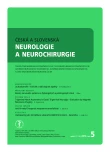-
Medical journals
- Career
Anti‑N ‑ Methyl ‑ D ‑ Aspartate Receptor Encephalitis
Authors: Z. Libá 1; J. Hanzalová 2; V. Sebroňová 1; V. Komárek 1
Authors‘ workplace: 2. LF UK a FN v Motole, Praha Klinika dětské neurologie, Ústav imunologie a neurologická klinika 1; 2. LF UK a FN v Motole, Praha Likvorová laboratoř, Ústav imunologie a neurologická klinika 2
Published in: Cesk Slov Neurol N 2014; 77/110(5): 624-630
Category: Short Communication
doi: https://doi.org/10.14735/amcsnn2014624Práce byla podpořena z nadačního fondu Pohyb bez pomoci. Děvana Dimmerová se podílela na zpracování mozkomíšních moků. MU Dr. David Krýsl se společně s RNDr. Jitkou Hanzalovou aktivně podílel na zavedení vyšetření autoprotilátek spojených s encefalitidami do repertoáru likvorové laboratoře ve FN v Motole. MU Dr. Zlata Baraniková se podílela na léčbě psychiatrických příznaků onemocnění. Kolegové z Pediatrické kliniky FN v Motole zajišťovali provedení eliminačních metod.
Overview
N-methyl-D-aspartate encephalitis is a recently defined autoimmune disorder of the central nervous system. Neurological symptoms are associated with antibody-dependent internalization of NMDA receptors that leads to synapse disruption. Information about the disease, therapy and diagnosis are followed by clinical experience with our group of five patients.
Key words:
anti-NMDAR encephalitis – diagnosis – therapy
The authors declare they have no potential conflicts of interest concerning drugs, products, or services used in the study.
The Editorial Board declares that the manuscript met the ICMJE “uniform requirements” for biomedical papers.
Sources
1. Greenlee JE. Treatment of paraneoplastic neurologic disorders. Curr Treat Options Neurol 2010; 12(3): 212 – 230. doi: 10.1007/ s11940 ‑ 010 ‑ 0066 ‑ 9.
2. Rosenfeld MR, Dalmau J. Anti‑NMDA ‑ receptor encefalitis and other synaptic autoimmune disorders. Curr Treat Options Neurol 2011; 13(3): 324 – 332. doi: 10.1007/ s11940 ‑ 011 ‑ 0116 ‑ y.
3. Florance ‑ Ryan N, Dalmau J. Update on anti‑N ‑ Methyl ‑ D ‑ Aspartate Receptor encephalitis in children and adolescens. Curr Opin Pediatr 2010; 22(6): 739 – 744. doi: 10.1097/ MOP.0b013e3283402d2f.
4. Gable MS, Sheriff H, Dalmau J, Tilley DH, Glaser CA.he frequency of autoimmune N ‑ methyl ‑ D ‑ aspartate receptor encephalitis surpasses that that of individual viral etiologies in young individuals enrolled in the California Encephalitis Project. Clin Infect Dis 2012; 54(7): 899 – 904. doi: 10.1093/ cid/ cir1038.
5. Kennedy PG. Viral encephalitis: causes, differential diagnosis and management. J Neurol Neurosurg Psychiatry 2004; 75 (Suppl 1): i10 – i15.
6. Grisold W, Giometto B, Vitaliani R, Oberndorfer S. Current approaches to the treatment of paraneoplastic encephalititis. Ther Adv Neurol Disord 2011; 4(4): 237 – 248. doi: 10.1177/ 1756285611405395.
7. Dalmau J, Lancaster E, Martinez ‑ Hernandez E, Rosenfeld MR, Balice ‑ Gordon R. Clinical experience and laboratory investigation in patients with anti‑NMDAR encephalitis. Lancet Neurol 2011; 10(1): 63 – 74. doi: 10.1016/ S1474 ‑ 4422(10)70253 ‑ 2.
8. Schmitt SE, Pargeon K, Frechette ES, Hirsch LJ, Dalmau J, Friedman D. Extreme delta brush: a unique EEG pattern in adults with anti‑NMDA receptor encephalitis. Neurology 2012; 79(11): 1094 – 1100. doi: 10.1212/ WNL.0b013e3182698cd8.
9. Titulaer MJ, McCracken L, Gabilondo I, Armangue T, Glaser C, Iizuka T et al. Treatment and prognostic factors for long‑term outcome in patients with anti‑NMDA receptor encephalitis: an observational cohort study. Lancet Neurol 2013; 12(2): 157 – 165. doi: 10.1016/ S1474 ‑ 4422(12)70310 ‑ 1.
10. Liba Z, Sebronova V, Komarek V, Sediva A, Sedlacek P. Prevalence and treatment of anti‑NMDA receptor encephalitis. Lancet Neurol 2013; 12(5): 424 – 425. doi: 10.1016/ S1474 ‑ 4422(13)70070 ‑ X.
Labels
Paediatric neurology Neurosurgery Neurology
Article was published inCzech and Slovak Neurology and Neurosurgery

2014 Issue 5-
All articles in this issue
- Surgical Treatment of Supratentorial Cortico‑ subcortical Cavernous Malformation
- Neutralising Antibodies and Myxovirus Resistance Protein A as a Marker of Biological Response to Interferon β
- Vasospasms as a Complication of Subarachnoid Hemorrhage – a Case Report
- Polyuria in Neurocritical Care – a Case Report
- Leukodystrophies – Clical and Radiological Findings
- Barriers of Nervous System under Physiological and Pathological Conditions
- The Use of Mesenchymal Stem Cells in the Experimental and Clinical Therapy of Spinal Cord Injury
- Volumetric Evaluation of Resecability of Insular Gliomas
- Validity of Enhanced Cued Recall Test in the Diagnosis of Alzheimer Dementia and Behavioral Variant of Frontotemporal Dementia
- Czech Training Version of the Montreal Cognitive Assessment (MoCA‑ CZ1) for Early Identification of Alzheimer Disease
- Repetitive Transcranial Magnetic Stimulation in the Treatment of Depressive Disorder – a Randomized, Single‑blind, Antidepressants‑ controlled Study
- Results of Surgical Treatment of Pituitary Adenomas in the Neurosurgery Clinic UH Olomouc
- Endoscopic Endonasal Technique in the Treatment of Craniopharyngiomas
- Neuroborreliosis Imitating Brain Tumour in Children and Vice Versa
- Anti‑N‑ Methyl‑ D‑ Aspartate Receptor Encephalitis
- Trigeminal Nerve Asymmetry in Classic Trigeminal Neuralgia – Evaluation by Magnetic Resonance Imaging
- Standardization of the Czech Version of the Tower of London Test – Administration, Scoring, Validity
- Czech and Slovak Neurology and Neurosurgery
- Journal archive
- Current issue
- Online only
- About the journal
Most read in this issue- Czech Training Version of the Montreal Cognitive Assessment (MoCA‑ CZ1) for Early Identification of Alzheimer Disease
- Leukodystrophies – Clical and Radiological Findings
- Barriers of Nervous System under Physiological and Pathological Conditions
- Surgical Treatment of Supratentorial Cortico‑ subcortical Cavernous Malformation
Login#ADS_BOTTOM_SCRIPTS#Forgotten passwordEnter the email address that you registered with. We will send you instructions on how to set a new password.
- Career

